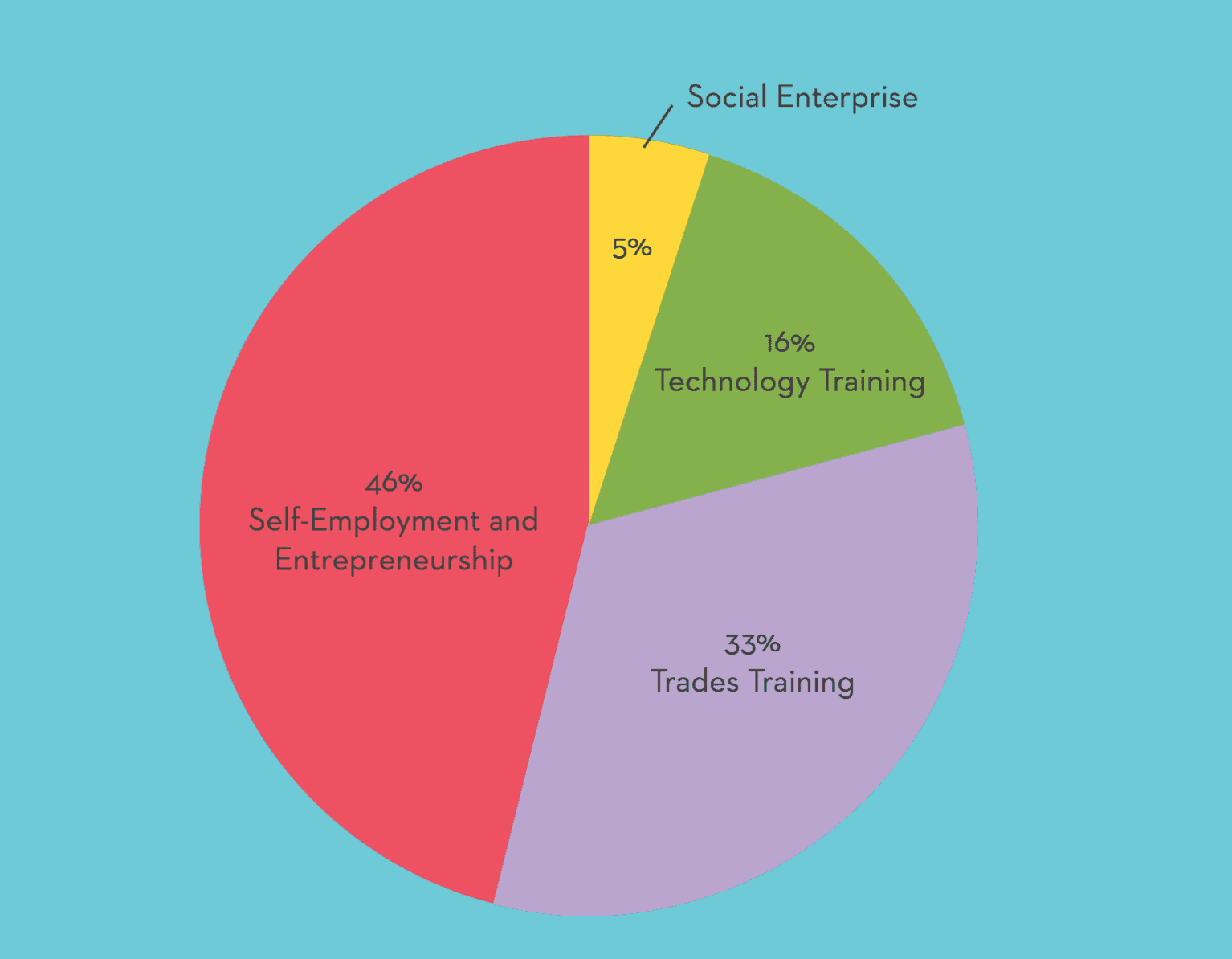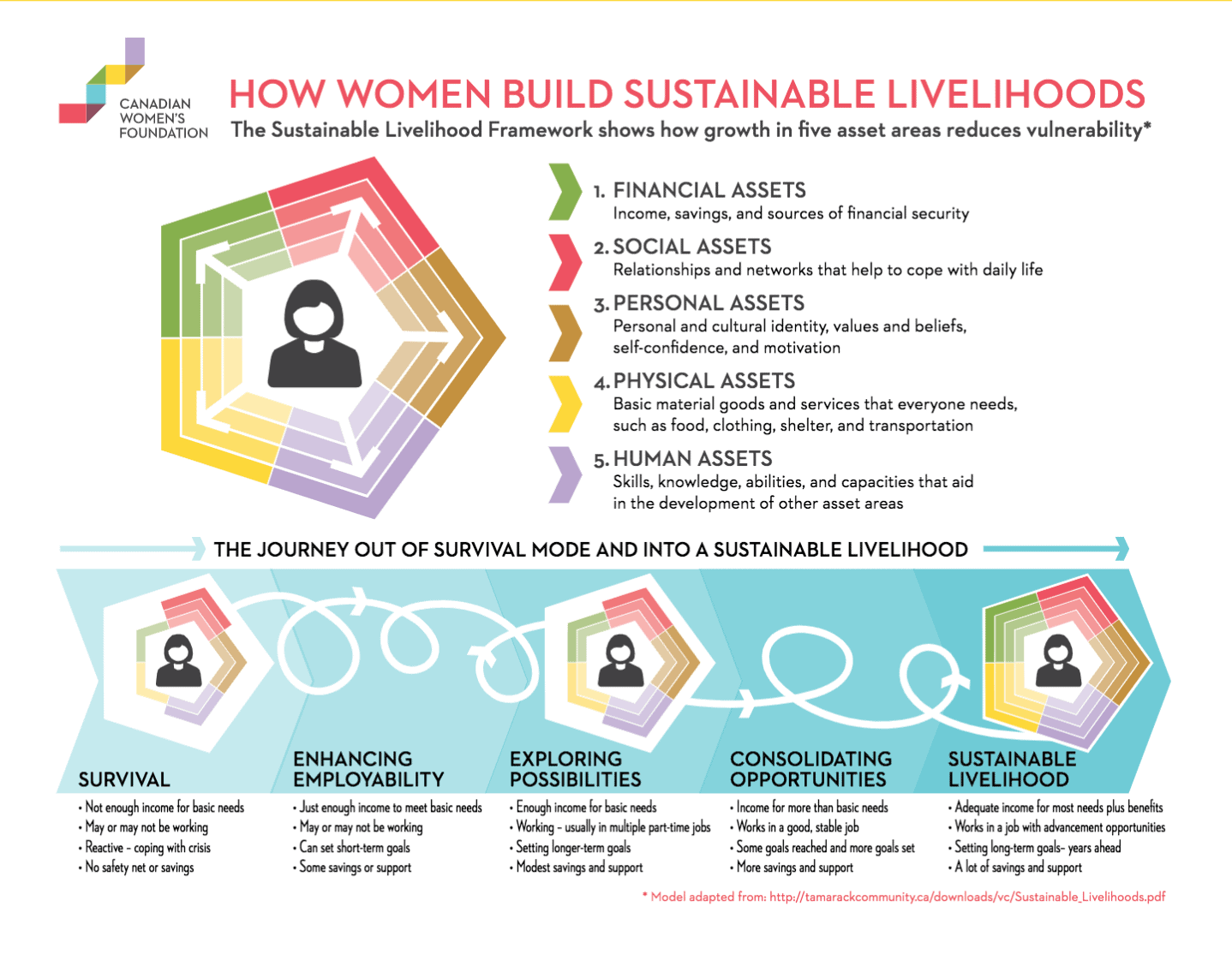THANK YOU FOR BEING TIRELESS.
Because of you, women and gender-diverse people gained new economic opportunities.
Throughout the uncertainties of the pandemic, you enabled them to train for employment and launch businesses.
You are a champion of economic security for those who need it most.
“While it was a bit of a challenge to move the program online … participants were able to access all the same training our program would normally offer, plus benefit from doing it all through a remote collaborative environment.”
“We shifted [our social enterprise] … to food preparation for the women’s shelter and human trafficking transitional residence; continued to provide members with discounted greens, increasing access to healthy foods; and participated in the virtual Social Enterprise World Forum.”
Your Action Matters.
Economic development initiatives for women and gender-diverse people in Canada are more important than ever.
The pandemic’s impact has been dubbed a “she-cession”. It disproportionately harms women.
Women have experienced historic job losses since March 2020. Even before the pandemic, women were more likely to live in poverty: more than 2.4 million women and girls live on a low income in Canada today.
Those who face many barriers, such as racialized women, women with disabilities, and newcomer women, are even more likely to experience poverty.
You Help the Helpers.
What’s more, community-based economic development programs tailored to women and gender-diverse people are struggling in the pandemic too.
Among local service providers surveyed by the Foundation, 80% are concerned they will have to shut down. These programs have not benefitted from much of the government emergency funds given to gender equality programs in 2020 and 2021, most of which were earmarked for gender-based violence services.
But local demand for these programs has only increased, especially from women who need to retrain as the pandemic pushes them out of the labour force. For example, Making Changes Association of Alberta reported a 45% increase in applications for their fall 2021 Women in Technology Program.
Applicants struggle with poverty, safety, and isolation, and the pandemic has only made matters worse. That’s why your action to support this critical work has been so remarkable. Because of you, close to 200 women and gender-diverse people were given the support they need to build a more sustainable future at such an uncertain time.
One Year Into the Gendered Pandemic: COVID-19 Timeline
You Help Break Cycles of Poverty.
Gendered poverty isn’t just about money. And building economic stability is a process.
It requires “wrap-around support” to help women and gender-diverse people break through barriers so they can successfully access economic development program opportunities. It requires dedicated trained workers to help program participants get childcare, juggle multiple priorities, afford course materials, and find secure and safe housing.
Program participants may need help in lots of areas, such as mental health and disability support. After the program is over, they may need more support to maintain good employment that improves life for them and their families. When you commit to breaking gendered cycles of poverty, you commit to building up caring communities to rally around those who need it: all hours of the day, all days of the week, whatever it takes.
Thank you for enabling whatever it takes.
You Help Build Better Futures.
Canadian Women’s Foundation’s Economic Development Programs: in a gender-equal Canada, gendered poverty will be a thing of the past. We know you believe that every woman and gender-diverse person deserves the chance to find economic security and freedom. When they do well, entire families and communities do well. That’s why you have taken generous action to support multi-year “Out of Poverty” economic development programs throughout Canada.
ECONOMIC DEVELOPMENT PROGRAM TYPES

Skilled Trades and Technology Programs
These programs help participants break into fields where women are traditionally underrepresented. Participants learn skilled trades such as construction, carpentry, electrical, and auto mechanics, and they build skills and competencies for work in technology. Participants may be matched with mentors, and many of the programs help women to pay for workplace essentials, like tools.
CNC Industrial Mechanic Millwright Pre-Apprenticeship Certificate Program, Women’s Enterprise Skills Training of Windsor (WEST) (Ontario): this 37-week program helps participants enter millwright/machining trades. It includes a placement, training in communication skills and computer literacy, and wrap-around support to reduce barriers to participant success.
TechWomen, Immigrant Services Society of BC (Vancouver): this pre-employment program prepares newcomer women for careers in the technology sector through web development and design training, tech-specific language skills, employment preparation training, and a practicum placement.
Women in Technology Employment Program, Making Changes Association of Alberta (Calgary): this training program for unemployed/underemployed immigrant and Indigenous women in Calgary combines employability skills upgrading, technical training in web development, and hands-on work experience.
Women Unlimited Program, Women Unlimited (Nova Scotia): helps diverse women build careers in trades and technology through a range of supports from career exploration and college-level training to employment and apprenticeship certification.
Digital Skills, Long Lake 58 at Long Lake 58 First Nation (Ontario): this First Nation-led education program prepares women for the digital economy through hands-on, project-based, and community-focused education in web development, e-commerce, digital marketing, and creative computing.
Self-Employment Programs
These programs help women with the nuts and bolts of entrepreneurship. They learn to develop viable ideas, create a business plan, and build a business network. They learn skills like marketing, sales, and product development, as well as essential life skills. Some get help finding a mentor, and some get help accessing loan funds to launch their businesses.
EntrepreNorth, MakeWay (Northwest Territories, Yukon, Nunavut): this 6-month program for community-based and Indigenous entrepreneurs helps them build sustainable businesses and livelihoods in Northern Canada.
Seizing the opportunity: You and your potential, Microcrédit Montreal (Quebec): this self-employment program for immigrant women provides start-up training and microcredit loans to enable participants to test their products/services and/or launch their businesses.
Women in Business, SEED Winnipeg (Manitoba): provides business development support for Indigenous and newcomer women to help them launch a new business or expand an existing one.
Employment My Way, YWCA Moncton (New Brunswick): trains women to research and write a business plan and offers additional support to help women succeed in starting or building an enterprise.
Social Enterprise Programs
These programs help women learn employment skills and gain work experience in “social purpose” businesses operated by community-based, non-profit organizations. They receive on-the-job training and coaching. Especially in the case of women who have been out of the workforce or who are new to Canada, these programs help them gain experience and confidence to succeed in a permanent job.
Operation Grow, Huronia Transition Homes (Ontario): this social enterprise, located in a centre that acts as a community hub, addresses the needs of women who have experienced violence. It is a vertical farm where participants are employed in a flexible, supportive environment. At the same time that participants build their knowledge of and access to good, healthy food, they develop their assets, social networks, and economic resilience.
You Uphold Dreams.
“It was my dream to have my own business and with this program I have been able to figure out my way. The facilitator provided us with all the necessary information and guidance to help build up not only our businesses, but also our confidence, and belief in ourselves, our power, and ability to go forward.”
“Three years ago, Claire* lived in Huronia Transition Home’s women’s shelter for 8 months. She was a single mother of four. Due to lack of affordable housing and financial barriers, it was very difficult for her to find housing. When she did leave the shelter, Claire became a member at Operation Grow and signed up for apprenticeship training. She found her voice, began connecting, and, for the first time in a long time, she made friends … Using Operation Grow as a reference, she was able to find full-time permanent employment she loves and no longer has to access social assistance.”
* a pseudonym
“I did this as a single mother with little support.
I did this because I had a team of wonderful people who packed up my life and scrubbed my apartment so I could move to the city and start this journey.
I did this even though putting my first child in daycare broke my heart, and hers.
I did this after missing a year of school to have my second baby.
I did this when my second baby was five months old and I was still nursing her.
I did this when the stress became so intense that my health took a dive.
I did this when people I love told me I should be a stay-at-home mom and my spouse should be out working.
I did this with the most supportive spouse who stopped working and volunteered to stay home with our children so I could graduate.
I did this when I found resources in my community led by people who wanted women like me to succeed.
I did this because I have family who didn’t want to see me fail so they paid gas for my 180 km commute when I was struggling.
I did this during a freaking pandemic.
I DID THIS.
If you don’t think you can succeed because you’re starting off with nothing, think again. Start your dream and the rest will come. Be resilient and don’t give up.”
You Enable Pandemic Resilience.
Economic development programs have to do new things in new ways to be there for their communities.
Your flexible, community-centred support helps them get creative in their important work. Nine out of 10 grantee partners shifted to virtual programming or a hybrid of online and in-person programming, following safety protocols. Online offerings included virtual training, mentoring, networking, and workshops.
Of course, this was accompanied by support for participants to access technology, such as providing devices, Internet services, and helping with childcare. Three grantee partners shared how they adjusted training curricula to rise to contemporary realities. For instance, some now focus on training entrepreneurs how to build their online presence and navigate ecommerce. Some are teaching participants how to interview for jobs online. Mental health and other new one-to-one support is provided to participants as well.
Program staff are being proactive in assessing what social, housing, health, wellness and childcare people need. One grantee created a peer partnership program to decrease social isolation. Another developed a 14-day land-based* wellness program to address increased substance use among community members.
*Refers to an Indigenized and environmentally-focused approach to education that recognizes the deep, physical, mental, and spiritual connection to the land (Danielle Cherpako, 2019).
You Spark Lasting Change.
A baseline level of stability is critical for women and gender-diverse people to dream, achieve, and succeed. Following a Sustainable Livelihoods Model, the programs you support focus on the whole person and provide wrap-around support to build participants up in a holistic manner.
And when they are cared for, safe, and secure, the community ripple effect is astounding. It leads stronger families and an end to intergenerational poverty.
Economic Development Programs of the Canadian Women’s Foundation move participants from Stage 2 to Stage 3 in the theory of change below.
Stage 2: Enhancing Employability: just enough money to meet basic needs, may or may not be working, can set short-term goals, some savings or support
Stage 3: Exploring Possibilities: enough income for basic needs, working (usually multiple part-time jobs), setting longer-term goals, modest savings and support

How Your Donations Are Used.
Economic Development Program Budget 2020-2021*
| Activity | Expense** |
|---|---|
| Grants to 10 community-led projects | $325,000 |
| Evaluation, translation, and supporting a community of practice | $44,784 |
| Granting support, promotion, and public engagement | $41,562 |
| Core support and administration | $61,702 |
| TOTAL | $473,048 |
*Note: Due to a fiscal year change, our 2020/2021 year was 7 months (September 1, 2020 to March 31, 2021)
**Final actual expenses to be confirmed in annual audit. Full financial statements will be available after September 1, 2021. ECONOMIC DEVELOPMENT PROGRAM BUDGET 2020-2021*
THANK YOU TO OUR GENEROUS SUPPORTERS!
$100,000+
Canadian Western Bank
RBC Royal Bank
Ricki’s
Scotiabank
$50,000-$99,999
Roslyn Bern, The Leacross Foundation
CIBC
$25,000-$49,999
Nancy Coxford
Groupe Dynamite Inc.
“Gender justice is both the tool and the goal to ensure Canada’s recovery.”
THANK YOU!
In all the ways you’ve taken action in this difficult year, thank you for building economic security and freedom for women and gender-diverse people who need it most. Gender inequality didn’t start with the COVID-19 virus.
And it’s been a matter of “pandemics within the pandemic” for those who face multiple barriers such as poverty, racism, and ableism. You know we’re not facing a short-term problem because its roots run so deep.
THANK YOU for demonstrating your drive for gender equity and justice to address the impacts of the pandemic on women, girls, gender-diverse people, and their families and communities.
You are helping to reverse the dire trajectories for those who face the highest barriers. Please stay close to us and keep raising your voices with us to call for nation-wide solutions where no woman, girl, or Two Spirit, trans, or non-binary person is left behind.
We will work together to build gender justice.
The Canadian Women’s Foundation is a national leader in the movement for gender equality in Canada. Through funding, research, advocacy, and knowledge sharing, we work to achieve systemic change. We support women, girls, and gender-diverse people to move out of violence, out of poverty, and into confidence and leadership. Since 1991, our partners and donors have contributed more than $130 million to fund over 2,500 life-transforming programs throughout the country.
We Need Your Thoughts and Ideas
Please join us at a virtual focus group in April or May to share your thoughts on barriers you see for women, girls, and gender-diverse people and opportunities to advance inclusion.



